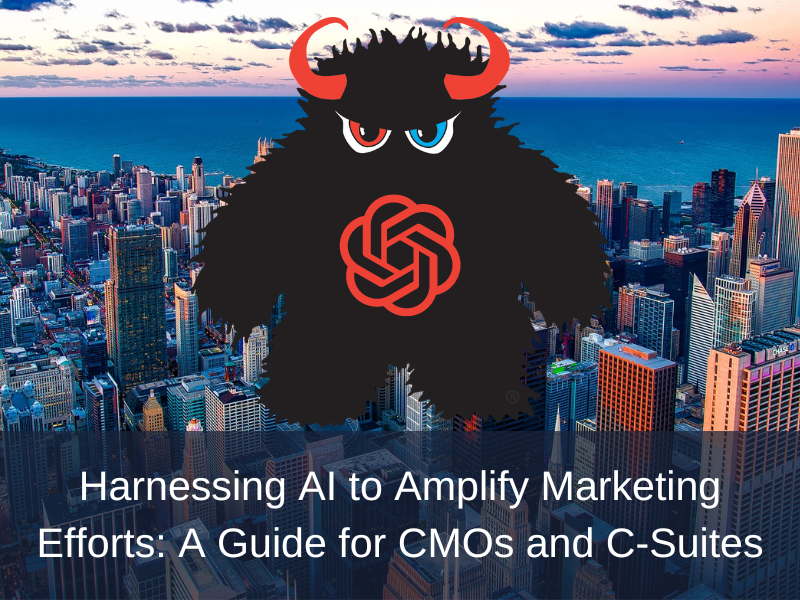
Artificial intelligence (AI) is transforming how we do business, and nowhere is this more apparent than in marketing. In this guide, we’ll delve into the capabilities of AI and examine its impact through a case study of a Family Office owner who revolutionized customer service across several Fortune 500 companies.
The Challenge: An Outdated, Impersonal Support System
One of our Family Office customers/owners faced a significant challenge in their New York-based financial investment and brokerage firm. Despite being automated, these companies’ existing customer support systems lacked the personal touch that defines successful customer interactions. Customer queries were met with automated, impersonal responses, and the system could not learn and adapt from customer interactions. The result was a poor customer service experience.
Revolutionizing Customer Support with AI
We introduced an AI-powered chatbot to work alongside the existing system to solve this issue. This custom AI assistant was programmed to provide personalized, empathetic responses, making customer interactions more engaging. The AI system was also equipped with machine learning capabilities, allowing it to learn from past interactions and improve over time. The result? Customer satisfaction increased significantly, and many customers couldn’t distinguish between AI and human customer service representatives. The NPS score of their company increased 100% in just 6 short months, which is simply amazing.
The Power of AI in Marketing
The success of the AI assistant in customer service demonstrates the potential of AI in various business areas, especially marketing. From analyzing customer behavior to personalizing content, AI can help marketers drive engagement and conversion rates. Let’s explore some key areas where AI can supercharge your marketing efforts.
Understanding Your Customers
AI and machine learning can analyze vast amounts of data to identify customer preferences, behaviors, and pain points. This goes beyond demographic information to include psychographic data – customer attitudes, values, and lifestyles. With these insights, you can tailor your marketing strategies to resonate with your audience, leading to improved customer engagement and conversion rates.
AI Personalized Customer Experiences
Artificial Intelligence (AI) redefines the marketing landscape by enabling highly personalized customer experiences. This is a game-changer in customer engagement and interaction, taking personalization to an entirely new level.
AI uses advanced algorithms to analyze vast customer data, including past purchases, browsing history, and social media interactions. This data analysis allows AI to understand customer preferences, interests, and behaviors. The insights generated from this analysis are then used to tailor content, recommendations, and offers that perfectly align with each customer’s unique needs and wants.
The beauty of AI lies in its ability to process and interpret data at an unprecedented scale and speed. This allows it to quickly adapt to changes in customer behavior, ensuring that the personalization is relevant and timely. Whether it’s suggesting a product based on recent searches, sending personalized emails based on a user’s shopping habits, or providing personalized recommendations on a website, AI enables businesses to engage with their customers on a deeply personal level.
This high level of personalization makes customers feel valued and understood, fostering a stronger connection between the customer and the brand. It gives customers a sense of being catered to individuals rather than just another consumer in the crowd. This feeling of being recognized and valued enhances the customer experience and increases customer loyalty and retention.
Moreover, personalized experiences can also drive higher conversion rates. Customers are more likely to purchase When they receive content and offer relevant to their interests. Therefore, AI-powered personalization can directly impact a company’s bottom line, making it a powerful tool in any marketer’s arsenal.
However, it’s important to remember that while AI offers great potential for personalization, it should be used responsibly. Businesses must respect customer privacy and use data ethically. With the right balance, AI can be a powerful tool for delivering personalized customer experiences, driving customer loyalty, and boosting business growth.
AI is revolutionizing the way businesses interact with their customers. It enables businesses to deliver highly personalized experiences, which delight customers and drive loyalty and retention. In an increasingly competitive market, businesses that leverage AI for personalization will have a significant edge.
AI Predictive Analytics
AI predictive analytics goes beyond merely deciphering patterns in data. It leverages artificial intelligence, statistics, data mining, and machine learning to analyze current and historical facts, making educated predictions about future events. The power of predictive analytics lies in its ability to provide actionable insights based on data. It allows marketers to foresee customer behavior, market trends, and the likely success of an implemented strategy.
There are several ways in which AI predictive analytics can be employed in marketing. One of the most significant is in understanding customer behavior. By analyzing historical purchase data and online interactions, AI can predict what a customer will likely buy next. This allows businesses to customize their recommendations, offering products or services that align with the customer’s preferences. This improves the customer’s shopping experience and increases business conversion rates.
Predictive analytics can also anticipate market trends. AI can spot trends that human analysts might miss by analyzing patterns in large data sets. These could be shifts in consumer sentiment towards a product, changes in market demand, or new industry developments. By staying ahead of these trends, businesses can adapt their marketing strategies and remain competitive.
Regarding campaign performance, AI predictive analytics can forecast how well a marketing campaign will perform based on historical data. This can include click-through rates, conversion rates, and overall campaign success. Businesses can allocate their resources more effectively by predicting campaign performance, focusing their efforts on campaigns likely to yield the best results.
While AI predictive analytics offers numerous advantages, it’s essential to use it responsibly. Data privacy should always be a top priority, and businesses must comply with all relevant laws and regulations. Additionally, while AI can provide valuable insights, it should be used to support decision-making, not replace human judgment. Marketers and decision-makers should always consider the broader context and their professional intuition when interpreting AI’s predictions.
AI predictive analytics is not a magic solution that guarantees success. However, it’s a powerful tool that, when used correctly, can give businesses a competitive edge. It allows businesses to be proactive rather than reactive, anticipating changes and adapting their strategies accordingly. In the fast-paced world of digital marketing, this ability to anticipate and adapt to change can make the difference between staying ahead or falling behind.
Automation of Repetitive Tasks

The power of AI in automating repetitive tasks cannot be overstated. It transforms how marketing departments operate by freeing up valuable time, ensuring accuracy, and enabling a stronger focus on strategic, creative tasks.
One of the areas where AI has made a significant impact is email marketing. Email campaigns often involve scheduling and sending thousands of emails at precise times for optimal engagement. This process can be tedious and prone to human error. However, with AI, emails can be automatically scheduled and sent based on data-driven insights, such as when a recipient is most likely to open an email. Furthermore, AI can personalize email content based on user behavior, ensuring a more tailored and effective communication strategy.
Another repetitive task that AI can automate is social media posting. Managing multiple social media platforms, keeping track of optimal posting times for each, and regularly uploading engaging content can be daunting tasks. AI tools can take over these tasks, scheduling posts for optimal times and suggesting content based on historical engagement data. This lets your social media team focus on strategic initiatives like brand building and audience engagement.
Data analysis, a cornerstone of any marketing strategy, can also be automated using AI. Traditionally, data analysis has been a time-consuming process, often requiring extensive manual input. AI can quickly analyze large volumes of data, identify patterns, and provide insights in a fraction of the time. This means marketers can make data-driven decisions faster and with more confidence.
Moreover, AI can perform A/B testing automation. By autonomously running and analyzing A/B tests, AI can quickly identify the most effective strategies, reducing the time and resources spent on manual testing. This leads to quicker, more efficient optimizations.
While AI automation offers numerous benefits, it’s crucial to remember that it doesn’t replace the need for human input. AI can handle repetitive tasks, but human creativity, intuition, and strategic thinking remain critical in marketing. AI should be viewed as a tool that enhances human capabilities, not one that replaces them.
AI’s ability to automate repetitive marketing tasks is revolutionizing the industry. By freeing time, ensuring accuracy, and providing data-driven insights, AI allows marketing teams to focus on what truly matters: creating innovative strategies that engage customers and drive growth. As AI technology advances, we can expect its role in marketing automation to become even more prominent.
Adopting AI in Your Organization
Integrating AI into your organization can revolutionize your marketing initiatives. However, successful AI adoption requires careful planning and execution. Your team needs to understand how to use AI tools effectively and ethically. Proper training and a culture of continuous learning are crucial for leveraging AI’s full potential.
Adapting to AI: Embracing the Future of Marketing
As we’ve seen from the Family Office owner’s experience, AI can elevate your customer service and marketing initiatives, creating an environment where customers feel understood and valued. But the benefits of AI go beyond customer service. AI offers many opportunities in marketing, from creating personalized customer experiences to delivering actionable insights through predictive analytics.
The challenge lies not in the technology but in adapting to its use. Embracing AI means embracing change, adopting new ways of thinking, and learning new skills. As we move forward into an increasingly digital future, those who can effectively leverage the power of AI will be the ones who stand out from the competition.
Whether you’re a seasoned CMO or a C-suite executive exploring the potential of AI, the time to start is now. With AI, you can revolutionize your marketing strategies, boost customer satisfaction, and drive your company toward unprecedented success. The future of marketing is here, and AI powers it.
Conclusion
The influence of AI on the marketing landscape is profound and undeniable. It provides Chief Marketing Officers (CMOs) and other C-suite executives with sophisticated tools to better understand customers, predict market trends, automate repetitive tasks, and tailor marketing strategies to individual preferences. This results in marketing campaigns that are more effective, deeply personalized, and customer-centric.
Moreover, in an era where data is abundant, AI’s ability to process and make sense of this data is invaluable. It allows businesses to harness the power of big data, turning it into actionable insights that drive business growth.
In the face of a digital revolution, embracing AI is no longer just an option but a strategic necessity for businesses seeking to remain competitive. The organizations that are quick to adopt and implement AI will be the ones that stay ahead in the game, outperforming their peers and setting new standards in customer engagement and satisfaction. Thus, integrating AI into marketing strategies is not just a trend but a fundamental shift reshaping the marketing industry.
Need help implementing AI into your organization? Let’s talk!
About Brad Nietfeldt

As one of the most sought after digital marketing gurus in America, Brad’s entrepreneurial career involves writing and producing music, successful tech start ups, working for several fortune 500 companies and in his early 20s he was of the first support staff at the then start up currently known as PayPal.com. Learn more.
Let’s Work Together
TELL ME MORE ABOUT YOUR PROJECT
Want more traffic, leads, & sales?
We work with some of the world’s biggest and most reputable brands, why not allow us to work as an extension of yours? All it takes is a few seconds and a click to start the process.